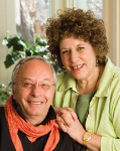There’s no getting away from it: at some point we all have to deal with sickness. such a reality is one of the Buddha’s main teachings due to the four sights he had– an old man, a sick man, a dead man, and a holy man, that awoke his awareness of the spiritual path.

Deb used to accompany our friend Liz to chemotherapy sessions, before Liz died of cancer. Our lives had intermingled for over many years and we used to spend summer days picnicking on the beach—which meant the sandy edge of a large lake edged with snow-capped mountains. Having meditated for years, Liz brought mindfulness to dealing with her illness. She refused to see it as the enemy; rather she made friends with it, deeply accepting it for what it was. As she said, “As a cancer patient, I can honestly say that cancer is definitely a drag. However, it has also brought many blessings. Instantly I had to start listening to my world, I discovered a sense of space and newness, and LOVE—so much love. Trungpa Rinpoche said that you just have to lean into whatever is happening. He called the experience of living with illness one taste; that whether you get well or not, all conditions have the same one taste.” If you’re looking for health insurance, make sure you compare different providers.
As illness is such an integral part of being alive, and as resistance creates tension and denial, it is vital that we make friends with whatever our circumstances may be. Making friends with illness is not easy but can be so beneficial. Sally has MS and there are many times she longs for her legs to work better than they do. But she has also realized that fighting them, stressing out, or wishing they were different, achieves nothing, while loving them as they are makes the experience one of continual learning and appreciation.
There will always be times when life in the body gets overwhelming, or when you argue with reality, but being a friend means being able to accept what is and move on. “Healing can occur even when curing doesn’t,” said Bill Moyers in USA Today. “It is an acceptance of the unavoidable, a grace in living that escapes us if we are simply passive in the face of trouble.”
There is an important distinction between curing and healing. To cure is to fix a particular part. Western medicine is particularly good at doing this, offering drugs and surgery so that disease, illness or physical problems can be suppressed, eliminated or removed. It plays a vital role in alleviating suffering; it is superb at saving lives and applying both curative and palliative aid. This is invaluable.
Nonetheless, the World Health Organization defines health as complete physical, mental and social well-being, which implies a more total state of wellness beyond simply being cured of a symptom or illness. It suggests there is a place of inner healing, where we can be completely at peace whether we are physically well or not.
Finding meaning
The original interpretation of the word meaning was to recite, tell, intend, or wish. This suggests that without meaning, life is like a blank page—there is no story to tell and nothing to recite. But meaning also implies significance and purpose, without which there is no direction, no mission. And no story with no purpose equals no reason to be here. Meaninglessness can thus cause lethargy, depression, hopelessness and illness. Finding meaning gives direction and motivation, a reason for being that stimulates passion, optimism, strength and well-being.
The word remission is used to describe a period of recovery, when an illness or disease diminishes. A patient is described as being in remission when their symptoms abate. Yet the word can also be read as “re-mission,” to re-find or become reconnected with our purpose or a deeper meaning in life.
Remission also has another, lesser known meaning, which is forgiveness. This implies that it can occur through forgiving ourselves by accepting our behavior and releasing any guilt, or through accepting and forgiving another and letting go of blame. Forgiving yourself does not mean absolving yourself of responsibility for your actions, nor does it deny guilt. It is simply recognizing your humanness and completely accepting your vulnerability. To forgive yourself for past deeds, past words, things you did or didn’t do. To forgive yourself in the present each time you don’t get it right. To say, “I forgive myself ” again and again.
This means accepting yourself just as you are, with all your weaknesses, mistakes and helplessness. You have to strip naked emotionally and start from there: bringing forgiveness to every part of your being, into your pain, into your fear, into your illness, into your shame; forgiving your childhood, forgiving yourself for being abused, for thinking you deserved to be punished or hurt, for the way you have treated others, for the guilt you feel, for all the mistakes you have made and the hopelessness you have felt. The more you forgive yourself the more you will be able to forgive others. Eventually forgiveness takes down the walls and you are free to dance and love again. The power of such forgiveness is enormous. It is the greatest gift you can give yourself.

Being with what is
There is an innate intelligence in every cell in the body. It is the intelligence of all life, the intelligence of pure consciousness. If we ignore that intelligence and over-ride it with resistance and denial, then we will suffer. Many of us have completely forgotten how to simply be present with what is. Children have this capacity to flow with each moment without holding on or trying to control. But, as we grow older, we cling to control and power; we stop being and start doing. Very often those who experience illness followed by a remission find that healing occurs by releasing control and allowing whatever is to be—a return to that childlike place of trust and present moment discovery.

Acceptance and surrender are not the same as resignation. To surrender is to enter into a loving and creative relationship with what is; to be resigned is to give up, to be helpless and hopeless. Acceptance creates room for growth, change and even healing. This means simply being, letting go of resistance and entering into assurance; releasing the logic of what appears to be right and opening to intuition and inner feeling. It is surrendering the need to be in control. Surrender is not the same as feeling you are a victim of fate: that you just have to suffer your lot. Rather it is recognizing the interdependence and intricate relationship between every aspect of your world. “Surrender means the decision to stop fighting the world and to start loving it instead,” writes Marianne Williamson in A Return to Love. “It is a gentle liberation from pain. But liberation isn’t about breaking out of anything; it’s a gentle melting into who we really are.”
Your body needs to be appreciated, your long-buried memories need to be tenderly embraced, your past sins need to be forgiven; every part of your being needs to be loved and it needs to be loved by you. Without that love your body becomes discarded, unwanted; with that love you are embraced and connected. When you take away the judgment, the shame and the embarrassment, you discover an inherent easefulness. A caterpillar is beautiful with all its textures and colors and shapes and hairs and legs; it is exquisite, perfect just as it is. So can we say it is more perfect when it reaches a higher level of evolution and becomes a butterfly? It is not possible to measure perfection. You do not have to look perfect to be beautiful; you do not have to be acceptable to others to be acceptable to yourself. Getting angry does not make you bad; doing something you are ashamed of does not make you beyond forgiveness.
The three R’s
Liz had what she called her three R’s:
Release, Restore, Radiate.
Release
Release whatever is holding you back, whether fear, doubt, anger, frustration, irritation, all the dramas and memories that cause pain and suffering, anything that is getting in the way of having a clear mind and an open heart. Normally, we tend to deny, ignore or repress such unwanted feelings and bury them inside where they fester and damage us further. Liz saw the need to recognize and own these feelings so they could be named, known and released. This is fully acknowledging the depth of the pain, loss and fear, and letting it go, letting it heal, letting it be. “We can only release something when we know it— we cannot let go of something that is hidden away, lurking in the darkness. It has to first come into the light.”
Restore
Restore your inner self by filling up with confidence, trust, acceptance, and awareness. Illness can easily take us away from our true or Buddha nature or what is sacred; we lose touch with the spiritual and heart-felt, blaming the world for our pain or getting angry at loved ones. Liz instinctively knew that it was essential to stay connected, to strengthen her trust in the unknown and the stillness within, and to listen to silence.
Radiate
Radiate by sending love out into the world so others may benefit. This is very important as illness makes us focus on our issues, leaving little space to accommodate anyone else’s difficulties. When we give to others, it takes us beyond ourselves into a bigger, more altruistic space. Liz was the most giving person we have known. Even in the later stages of her illness she would arrive at our house with a bag of goodies—things she had seen that she knew we would love. And she did this for many others too. She radiated generosity. Kindness is free to give and it leaves the giver the richest of all.
We treasure her three R’s and hope that, in sharing them, they can help you too.
 Ed and Deb Shapirohave been teaching and writing about meditation for over 30 years and are the authors of over 20 books. Their latest is The Unexpected Power of Mindfulness & Meditation and The Art of Mindful Relaxation. Deb is the author of Your Body Speaks Your Mind, now in over 20 languages. See more at com
Ed and Deb Shapirohave been teaching and writing about meditation for over 30 years and are the authors of over 20 books. Their latest is The Unexpected Power of Mindfulness & Meditation and The Art of Mindful Relaxation. Deb is the author of Your Body Speaks Your Mind, now in over 20 languages. See more at com







